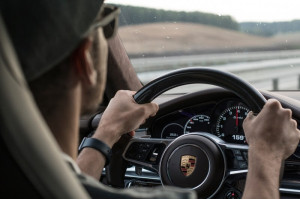« Articles
Porsche to Include Native Google Apps in Future Cars

In a world where technology and vehicles increasingly intertwine, Porsche has made a significant move. The luxury car manufacturer has announced its decision to integrate native Google apps into its upcoming car models. This decision not only underscores Porsche's commitment to innovation but also highlights the broader shift in the automotive industry towards digital connectivity and enhanced user experiences.
Porsche's Announcement
Porsche's recent announcement has stirred excitement among tech enthusiasts and car aficionados alike. The company revealed plans to introduce native versions of some of Google's most popular apps, including Maps and Assistant, into its future car models. This integration signifies a deeper collaboration between the tech giant and the automaker, aiming to elevate the driving experience to new heights.
But the partnership doesn't stop at just apps. Porsche is set to adopt Googles advanced software for its in-car infotainment systems. This move promises a more seamless and integrated user experience, akin to using a high-end smartphone. Furthermore, Porsche vehicles will benefit from over-the-air software updates, ensuring that the car's software remains up-to-date with the latest features and improvements. These updates prioritize Porsche's customers' privacy, ensuring data protection without the need for frequent visits to service centers.
Volkswagen's Software Challenges
While Porsche strides forward with its tech integration, its parent company, Volkswagen, faces a contrasting scenario. Volkswagen has been grappling with software challenges, which have posed significant hurdles in its digital transformation journey. These challenges have been so pronounced that the company recently revealed plans to lay off around 2,000 employees at its in-house software provider, Cariad.
These software setbacks have had tangible consequences. Volkswagen has experienced delays in the launch of its new software architecture, a crucial component for its future vehicles. This contrast between Porsche's advancements and Volkswagen's challenges offers a glimpse into the complexities and varied pace of tech integration within the automotive industry.
Evolution of In-Car Apps

The automotive world has been witnessing a surge in the integration of apps optimized for in-car use. Volkswagen, for instance, introduced a new app store for its drivers. This store features a range of third-party apps, from entertainment platforms like Spotify and TikTok to utility apps like Yelp, all optimized for in-vehicle use.
The last few years have seen a marked rise in the popularity of automotive-specific apps. As vehicles become more connected and smarter, drivers and passengers increasingly expect their cars to offer functionalities and features reminiscent of their smartphones. This expectation has driven automakers to innovate rapidly, ensuring that modern vehicles aren't just modes of transportation but also hubs of digital connectivity and entertainment.
Integration of Native Google Software Apps
The integration of native Google software apps into Porsche vehicles marks a significant leap in the automotive industry's journey toward digital transformation. By embedding these apps directly into their infotainment systems, Porsche is setting a new benchmark for in-car digital experiences. Additionally, the Porsche Mission R, with its cutting-edge design, is anticipated to be a flagship model showcasing these advanced digital features.
One of the primary benefits of this integration is the enhanced user experience. Native Google apps, renowned for their user-friendly interfaces and robust functionalities, will provide Porsche drivers and passengers with a seamless and intuitive digital environment. Whether it's navigating with Google Maps, using voice commands with Google Assistant, or accessing a plethora of other Google services, the experience is set to be unparalleled.
This move by Porsche also signifies a commitment to offering its customers a new level of digital experience. Modern consumers, accustomed to the conveniences of smart devices, now expect similar digital competencies from their vehicles. By integrating Google's software, Porsche is not only meeting these expectations but is also positioning itself as a frontrunner in the race toward fully connected vehicles.
However, Porsche isn't the only automaker to recognize the potential of this tech integration. Several other leading car manufacturers, including Honda, GM, Polestar, Volvo, and Ford, have already incorporated Google built-in or Android Automotive into their vehicles. While each automaker offers a unique take on this integration, the overarching goal remains consistent: to enhance the driving experience through advanced digital solutions.
Future Plans and Expectations
Porsche's ambitions don't stop at the current integrations. The company has laid out plans to release the first set of vehicles equipped with Google built-in by the mid-decade. While the anticipation is palpable, Porsche has kept the specifics under wraps, not revealing which models will feature this advanced tech integration. This strategic move keeps the automotive community and potential buyers in suspense, eagerly awaiting the next big announcement.
In addition to the Google software integration, Porsche remains committed to ensuring versatility in its digital offerings. The company plans to continue its support for phone mirroring capabilities. This feature allows customers to project their smartphone interfaces onto the vehicle's infotainment screen, using platforms like Android Auto or Apple CarPlay. Such a feature ensures that even if users prefer their phone's interface or specific apps not natively integrated, they can still access them with ease while on the move.
You may also like: Porsche Warns About High-Interest Rates Impacting Demand.
Conclusion
In the rapidly evolving landscape of automotive technology, Porsche's decision to integrate native Google apps signifies a monumental shift towards a more connected and digitally immersive driving experience. As vehicles transform from mere modes of transportation to sophisticated digital hubs, automakers like Porsche are leading the charge.
By embracing cutting-edge technology and prioritizing user experience, Porsche is not only setting new industry standards but also redefining what modern driving entails. As we look to the future, it's evident that the fusion of automotive prowess with digital innovation will drive the next era of motoring, with Porsche at the forefront of this revolution.
Featured Video
The fastest Porsche 911 ever made | Turbo S
The Porsche 911 has a turbo boost button but you only have 20 seconds...

Comment using Facebook